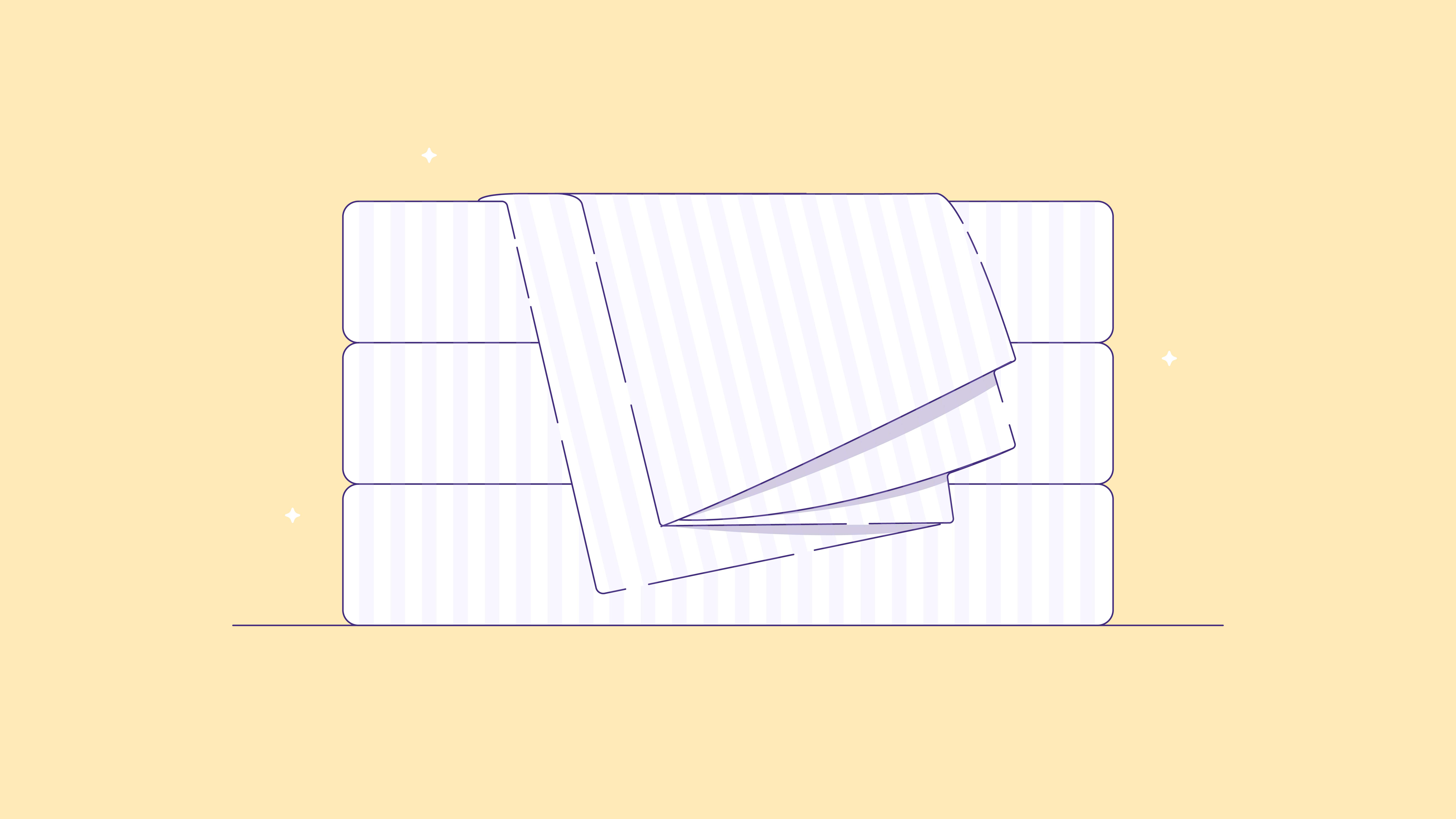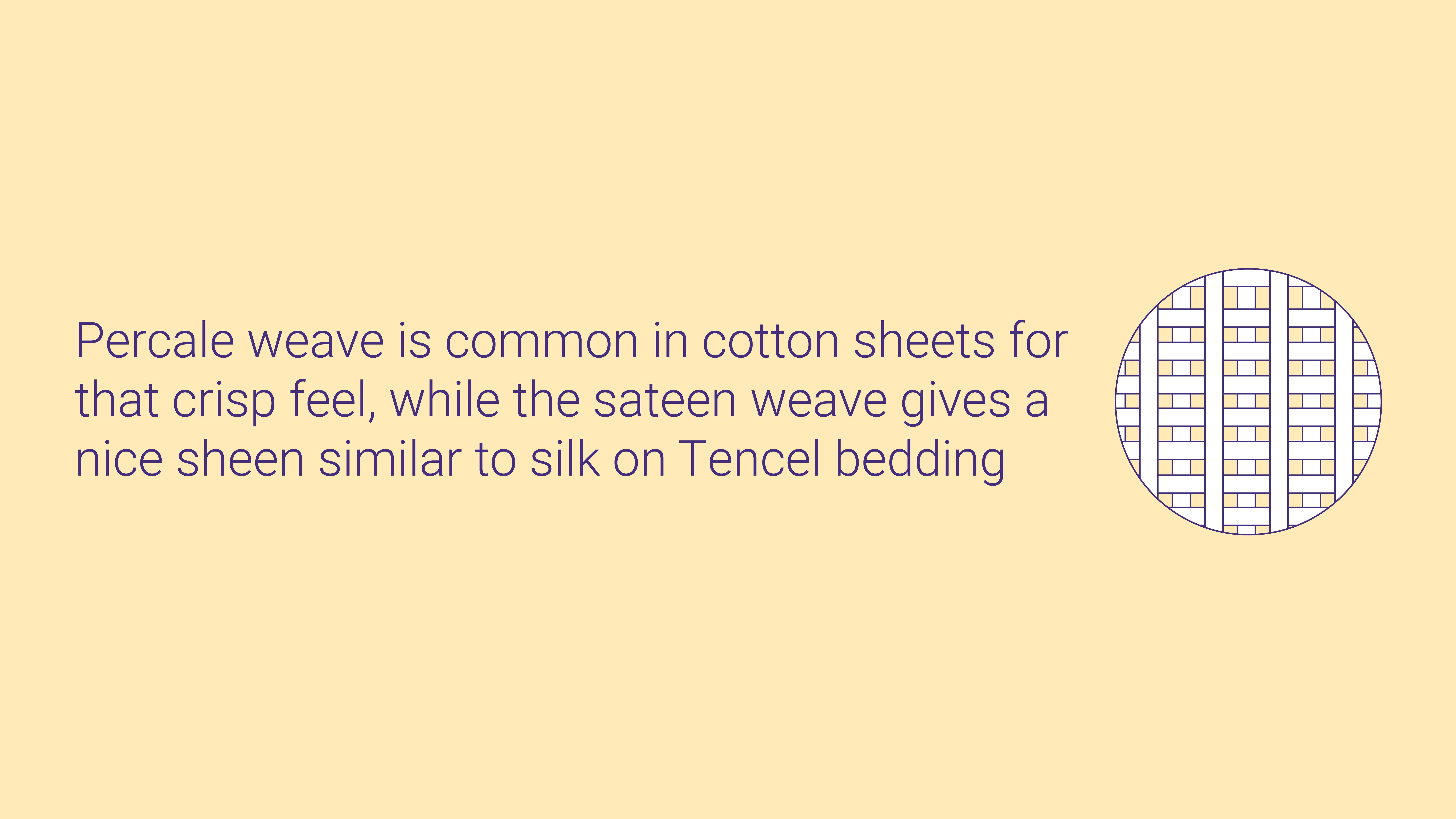
Tencel vs. Cotton Sheets: What’s the Difference?

If you’re a hot sleeper, keeping cool at night can be a struggle. Waking up from overheating leads to sleep deprivation, so you feel less focused during the day. However, switching to bedding made with Tencel or cotton ensures comfortable sleep. Both fabrics enable airflow so there’s less risk of waking up hot.
Our article reviews how both Tencel and cotton fabrics are made, the pros and cons of each material, and what to consider when choosing a Tencel or cotton sheet set.
What are Tencel Sheets?
Tencel sheets are made from the pulp of eucalyptus wood. The pulp or wood cellulose is mixed with a chemical solvent through a chemical process, then pushed through small holes in a spinneret nozzle to create wood cellulose fibers. These cellulose fibers are chemically treated, spun into thread, and woven into fabric. The resulting smooth material, known as Tencel lyocell fabric, has a silky feel and a slight sheen.
That said, while Tencel is a lyocell fabric, not all lyocell fabrics are Tencel. For a comparison of general lyocell to cotton, see our guide Lyocell vs. Cotton Sheets: Which is Best?
Tencel fabric is semi-synthetic because it contains other natural fibers, like cotton and wool, or synthetic fibers, including polyester and nylon. Tencel fibers are created through a “closed-loop process,” where all solvents are reused, making Tencel eco-friendly.
The wood pulp of eucalyptus trees is also gathered from eucalyptus trees grown in irrigated lands without pesticides and chemical fertilizers—this manufacturing process has a low environmental impact.
Pros of Tencel Sheets
- Looks and feels like silk—the smooth fabric won’t irritate sensitive skin
- Hypoallergenic
- Wrinkle-resistant with a nice drape over the bed
- Strong, durable fibers experience little to no shrinking after washing
- Cool, eco-friendly material makes Tencel a great option for hot sleepers
Cons of Tencel Sheets
- Tencel sheets are expensive because of production processing costs
- Some Tencel sheet sets can only be hand-washed since machine washing may cause damage
What are Cotton Sheets?
Cotton sheets are made from the fluffy seed pods of cotton plants. Cotton has been produced for hundreds of years and manufactured into different products, like clothing and bedding.
The price and quality of cotton sheets depend on the staple or length of the cotton fiber. The longer the fiber, the more soft and luxurious the material. Long-staple cotton, like Egyptian Cotton or Pima Cotton, are popular choices for bed sheets because longer staple cotton is more durable than short-staple cotton.
Short-staple cotton is less expensive than long-staple cotton, but the fabric breaks down faster due to the shorter fibers. While it may seem budget-friendly to purchase short-staple cotton sheets, the material won’t last long.
Pros of Cotton Sheets
- Feels softer after every wash
- Available in a wide price range
- Most sheet sets are machine washable for easy maintenance
- Crisp and cool fabric won’t trap body heat
Cons of Cotton Sheets
- Some cotton sheet brands are not eco-friendly because chemical fertilizers and pesticides are used to grow large amounts of cotton plants
- Prone to wrinkling and may require ironing
Difference between Tencel and Cotton Sheets

Tencel and cotton have different fibers, which can affect how the material feels. Both fabrics are soft and breathable but have different features which may make one fabric more appealing than the other. For example, both Tencel and cotton feel cool, but Tencel is a better option for hot sleepers because Tencel wicks away more moisture than cotton.
| Fabric | Tencel | Cotton |
|---|---|---|
| Feel | Silky and luxurious | Crisp and cool |
| Durability | Highly durable compared to some cotton sheets | Depends on fiber—long-staple cotton most durable |
| Cooling | Breathable and more effective at wicking away moisture than cotton | Breathable fabric, but can’t wick away as much moisture as Tencel |
| Shrinkage | Minimal shrinking after the first wash | Shrinks more than Tencel, varies depending on cotton type |
| Price | High price-point | Wide range of prices, affordable and high-end options |
| Maintenance | Some Tencel sheets require hand washing | Most cotton sheets can be machine washed in cold water |
| Wrinkle Resistance | Resistant to wrinkles | Prone to wrinkles |
| Eco-Friendly | Environmentally-friendly thanks to sustainably-sourced eucalyptus trees and closed-loop process | Most cotton sheet brands are not environmentally-friendly, but some organic cotton sheets are |
Considerations When Buying Sheets
Important factors, like thread count, weave, size, price, and available colors and designs, could determine which type of fabric you choose—Tencel or cotton.
Thread Count
Thread count determines the quality in a sheet set. A thread count is defined as the number of threads woven into a square inch of material. Contrary to popular belief, high thread count does not mean high quality.
Some manufacturers claim their sheets have a thread count over 1,000, but it’s not possible to fit that many threads inside one square inch of material. Companies use methods to boost the thread count, but the bed sheet quality isn’t as high as sheets with a 600 thread count. The best thread count for both Tencel and cotton sheets is between 300 and 600. The threads are strong and durable, able to withstand wear and tear from regular use.
Weave
Feel, durability, and overall appearance all contribute to the weave. How threads are woven can also determine the breathability and cost of a set of sheets. Some weaves have tightly woven fibers, restricting airflow and trapping body heat. Other weaves have more gaps in between threads for breathability.
There are two main types of weaves found in Tencel and cotton sheets—percale and sateen. Percale weave is common in cotton sheets for that crisp feel, while the sateen weave gives a nice sheen similar to silk on Tencel bedding. If you have sensitive skin, Tencel material is the best choice because there’s less risk of allergic reactions to Tencel’s smooth surface compared to cotton.
Size
Both Tencel and cotton bed sheets are available in standard mattress sizes, from twin to California king. You can almost certainly find one sized to fit your mattress, but it’s important to know the dimensions of your bed.
Before buying a sheet set, measure the thickness of your mattress and include the mattress topper in your measurements if you have one—the deep pockets of a fitted sheet may only cover a specific mattress thickness.
You want to make sure a sheet set, whether it’s Tencel or cotton, fits snug around your mattress. Particularly if you’re a hot sleeper pairing one of these breathable sheets with a cooling mattress topper.
Price
Tencel sheets are more durable than cotton sheets, but Tencel is more expensive. The average cost for a Tencel sheet set ranges between $100 to $200 for a queen size, while the average price for cotton sheets is $50 to $150 for a queen size.
The price tag for cotton sheets also depends on the staple fibers. Long-staple cotton is stronger and softer than short-staple cotton, so long-staple cotton sheets will come at a higher price tag.
Color and Design
Tencel is not as widely available as cotton sheets, which means Tencel may not come in as many colors as cotton. Cotton sheets, on the other hand, come in a wide variety of colors and designs. Some of the best sleep-inducing colors include blue, yellow, green, silver, orange, and pink. These colors promote feelings of relaxation and could improve sleep quality. Try to stick with soft, pastel shades—bright colors may stimulate the brain, causing you to feel alert.
FAQs
What’s the difference between Tencel and bamboo sheets?
Both Tencel and bamboo sheets are manufactured through a similar process, except bamboo sheets are made from bamboo cellulose instead of eucalyptus. Bamboo fabric, also known as viscose rayon, feels softer than cotton, but doesn’t feel as silky smooth as Tencel sheets. Tencel sheets also wick away more moisture than bamboo, making them a better option for hot sleepers.
Does Tencel shrink like cotton?
Tencel may slightly shrink after the first wash, but resists shrinking afterward. Tencel sheets need more maintenance than cotton sheets because some Tencel brands require hand washing which takes longer than machine washing. Cotton sheets may continue to shrink with each wash.
What is the best material for hot sleepers?
Tencel and cotton sheets are good options for hot sleepers. Both cooling fabrics enable better airflow, so hot air can escape, however, Tencel is the best sheet choice for hot sleepers because the fabric is more effective than cotton in wicking away moisture. Other materials, like polyester, traps heat and causes night sweats.
Can I tumble dry Tencel?
Some Tencel sheets can be machine washed and dried. Make sure to follow the cleaning instructions on how to best care for your Tencel sheets. If your dryer has an “Air Dry” setting, you may use this setting to dry your Tencel sheets instead of hanging dry.
Is Tencel natural or synthetic?
Tencel is both natural and synthetic. The material is made from wood, but the finished fibers are man-made with chemical solvents. Tencel fabric is often referred to as regenerated cellulose instead of natural or synthetic material.
Conclusion
Both Tencel and cotton are soft, breathable fabrics and excellent options for sleep. Tencel and cotton fabrics wick away moisture and prevent you from waking up hot.
Tencel sheets have a smoother surface than cotton, a nice feature if you have sensitive skin. However, cotton is less expensive than Tencel with a wider variety of colors and designs to choose from. Depending on your preferences, you may like one material over the other, but for hot sleepers, we recommend Tencel sheets for optimal cooling.
